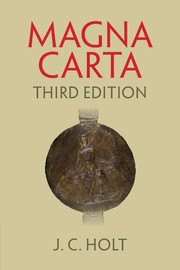Book contents
- Frontmatter
- Dedication
- Contents
- List of plates
- Preface to third edition
- Preface to second edition
- Preface to first edition
- Acknowledgements
- Abbreviations
- Introduction
- 1 The Charter and its history
- 2 Government and society in the twelfth century
- 3 Privilege and liberties
- 4 Custom and law
- 5 Justice and jurisdiction
- 6 Crisis and civil war
- 7 Quasi Pax
- 8 The quality of the Great Charter
- 9 The achievement of 1215
- 10 From distraint to war
- 11 The re-issues and the beginning of the myth
- Appendices
- References
- Index
- Plate section
9 - The achievement of 1215
Published online by Cambridge University Press: 05 July 2015
- Frontmatter
- Dedication
- Contents
- List of plates
- Preface to third edition
- Preface to second edition
- Preface to first edition
- Acknowledgements
- Abbreviations
- Introduction
- 1 The Charter and its history
- 2 Government and society in the twelfth century
- 3 Privilege and liberties
- 4 Custom and law
- 5 Justice and jurisdiction
- 6 Crisis and civil war
- 7 Quasi Pax
- 8 The quality of the Great Charter
- 9 The achievement of 1215
- 10 From distraint to war
- 11 The re-issues and the beginning of the myth
- Appendices
- References
- Index
- Plate section
Summary
Magna Carta was not a simple statement of law. That part of it which was confirmed in 1217 and 1225 did in fact become law. But it was not an accurate statement of law as it had been before 1215. Its supporters claimed that it was. Indeed, their arguments had been concentrated on reviving the ‘good old laws7’ and confirming existing privileges and liberties. But theirs was only one side of the case. The other side was equally convinced. The papal agents who excommunicated the king's opponents in the autumn denounced them for introducing new laws and depriving the king of his customary rights. Maitland asserted that ‘the charter contains little that is absolutely new. It is restorative. John in these last years has been breaking the law; therefore the law must be defined and set in writing.’ McKechnie likewise frequently assumed that John had been breaking principles which Magna Carta largely confirmed. But this is to accept the opposition's case and to by-pass important problems. How far, for example, did Magna Carta state existing law? Where it did, had John been breaking it? Whether it was law or not, was John the only king to contravene its principles?
None of these questions permit simple answers applicable to every clause. For example, it was existing law to levy aids by consent as cap. 12 of the Charter confirmed, but there is no certain evidence that John or any other king had habitually levied aids in any other manner. In contrast, it seems to have been generally accepted that knightly tenants of escheats in the king's hands should pay reliefs at the rate of £5 per fee. John had sometimes broken this rule, and so occasionally had Henry II.
- Type
- Chapter
- Information
- Magna Carta , pp. 254 - 290Publisher: Cambridge University PressPrint publication year: 2015



